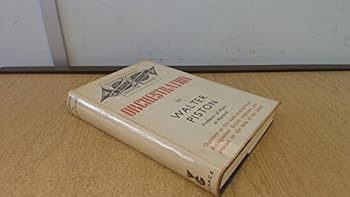Orchestration
Select Format
Select Condition 
Book Overview
Again he draws upon his own wide knowledge and experience as composer and teacher to present all phases of the subject. No practical aspect of instrumentation for the orchestra is neglected, and... This description may be from another edition of this product.
Format:Hardcover
Language:English
ISBN:0575011319
Release Date:January 1955
Publisher:W.W. Norton
Length:488 Pages
Weight:1.90 lbs.
Customer Reviews
5 ratings
Second best orchestration book available
Published by Thriftbooks.com User , 19 years ago
The best book on this subject, the one that I actually sometimes refer to when composing, is Kennan's. Piston's book, however, should definitely be carefully studied by anyone wanting to master the art of classical orchestration. Piston goes deeper into each instrument than Kennan does, establishing a root level of knowledge on top of which Kennan can then serve as a handy daily reference. Piston relies heavily on examples from the core classical repertoire (well into the early 20th century but not beyond), so access to a good CD library will go a long way in bringing this book to life.
One of the best general resources for orchestration
Published by Thriftbooks.com User , 20 years ago
This book, though not the easiest text on the subject to read, is as detailed as any resource on the subject of orchestration can be. It offers the average musician that knows the basics of his own instrument to learn about the details of the other parts of the orchestra, and offers a basic outline of the typical uses of each section. This is a great text for the beginner composer and arranger who wants to learn one of the proper ways to utilize an orchestra. The only recommendation I can make is that the reader not use this books as law, but rather as principle. The ideas and definitions of this book are not completely concrete, and greatness often comes from innovation. This book, though, offers a great path towards a basic understanding of the workings of a live ensemble and it's effect on the nuances of a composition.
Brilliant!
Published by Thriftbooks.com User , 22 years ago
This is an unbelievable book in terms of material and presentation. The clarity and focus is admirable. It is comprehensive, adequately pedantic and very well written with very little 'waffle'. An ideal text for all levels of musicians. The section on percussion and woodwind are especially noteworthy. This book is better than that of the same title by Forsyth, by a long shot. I thoroughly enjoyed it!
This is the one (but also buy the Forsyth)
Published by Thriftbooks.com User , 23 years ago
Wow! A reviewer below really hit the nail on the head. All I can do besides expressing my appreciation (thank you!) is to concur and amplify. I have on my shelf orchestration books by Kent Kennan, Cecil Forsyth, Rimsky-Korsakov, Hector Berlioz (revised by Richard Strauss), and Walter Piston. I have read Rene Leibowitz's and also read or skimmed through various others. The Walter Piston text is the last I acquired, and I really wish I'd bought it long ago. It makes clear what the others do not, what I had to learn by trial and error. It's writing is more plodding than Piston's "Counterpoint" and his "Harmony" (I mean Piston's "Harmony", not Mark Devoto's "Harmony"), but no more plodding than any other orchestration text except Cecil Forsyth's. The solution is to buy both the Piston and the Forsyth.
The Bible of orchestration basics
Published by Thriftbooks.com User , 26 years ago
This is it, the reference work you should have bought back in college when you first studied orchestration. It's comprehensive and comprehensible, thoroughly elaborating on the strengths and weaknesses (in all registers) of the standard orchestral palette. A bit lacking in imagination and inventiveness -- but, hey, it's a reference work...





